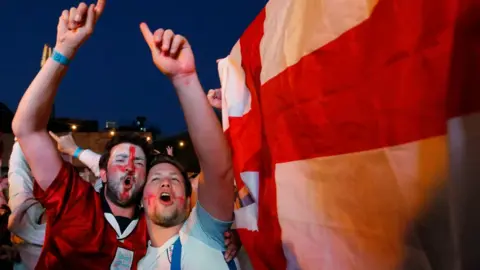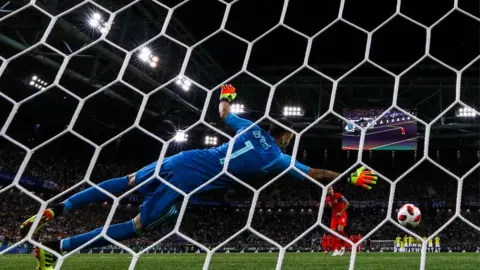World Cup economic boost could be worth billions
 Getty Images
Getty ImagesThe economy could receive a boost worth billions if England make it to the World Cup final, research suggests.
Work done by the Centre for Retail Research (CRR) estimates that the economy has benefitted from extra spending of more than £1bn this year.
The centre estimates that spending will rise to £2.7bn if England makes it to the finals.
It says much of the spending will be at shops with fans stocking up on food and drink before watching matches at home.
Professor Joshua Bamfield, CRR director, said the amount spent so far was about £800m more than during the 2014 World Cup when England crashed out of the tournament before reaching the knockout stages.
In its report on the last World Cup the CRR says: "Every goal scored by an England footballer - right the way to the final - would be worth £165.3m to England's retailers and an extra £33.2m to pubs, hotels and restaurants."
However England goals in 2014 proved to be thin on the ground.
Prof Bamfield said: "At the last World Cup we didn't get past the group stage and from a retail point of view sales fell off a cliff.
"This time no one expected much - they were so used to being kicked in the teeth - but once they started playing it all changed.
"The spending patterns also fit in with the current retail theme of 'experience'. People want to spend their money going to the pub or having a barbecue with their friend and watching the match."
 Getty Images
Getty ImagesLast week pub owner Greene King, after reporting a disappointing set of profits for last year, said things were looking up thanks to the hot weather and the World Cup.
The chain sold half a million extra pints during the Panama match.
Chief executive Rooney Anand said: " It remains true that when the sun shines, or sport is on, people do want to go to the pub."
Feelgood factor
Prof Bamfield said the World Cup also provided a reason for consumers to splash out on electronics such as a new bigscreen television.
"People may have been meaning to get a new TV or computer for some time and the World Cup gives them the opportunity to make the decision," he said.
"Also, people are buying souvenirs, parents and grandparents are using the competition as a reason to buy kit for children."
Economists are also seeing the competition add some optimism to the strong numbers reported on Wednesday for the UK's services sector.
Howard Archer, chief economist at the EY Item Club, said: "A significantly improved survey for the dominant services sector adds to the feel good factor, after England actually winning a penalty shoot out to reach the quarter finals of the World Cup."
However, if sporting success leads to stronger economic growth it may also lead to higher interest rates.
Andy Haldane, the Bank of England's chief economist and a member of its Monetary Policy Committee, said World Cup success was adding to the general recovery of the economy.
"The underlying picture now appears to be one of gently rising household spending," he said.
"And then, of course, there is the World Cup. Without wishing to tempt fate, England's recent sporting success on the football field... has probably added to that feelgood factor among England-supporting consumers."
